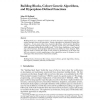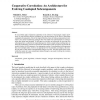151
Voted
EC
2002
15 years 2 months ago
2002
Previous work on multiobjective genetic algorithms has been focused on preventing genetic drift and the issue of convergence has been given little attention. In this paper, we pre...
141
Voted
EC
2000
15 years 2 months ago
2000
In this paper, we provide a systematic comparison of various evolutionary approaches to multiobjective optimization using six carefully chosen test functions. Each test function i...
132
Voted
EC
2000
15 years 2 months ago
2000
Solving optimization problems with multiple (often conflicting) objectives is, generally, a very difficult goal. Evolutionary algorithms (EAs) were initially extended and applied ...
116
Voted
EC
2000
15 years 2 months ago
2000
Holland's Adaptation in Natural and Artificial Systems largely dealt with how systems, comprised of many self-interested entities, can and should adapt as a whole. This semin...
114
Voted
EC
2000
15 years 2 months ago
2000
We evaluate whether John Holland's Echo model exemplifies his theory of complex adaptive systems. After reviewing Holland's theory of complex adaptive systems and descri...
112
Voted
EC
2000
15 years 2 months ago
2000
Building blocks are a ubiquitous feature at all levels of human understanding, from perception through science and innovation. Genetic algorithms are designed to exploit this prev...
141
Voted
EC
2000
15 years 2 months ago
2000
To successfully apply evolutionary algorithms to the solution of increasingly complex problems, we must develop effective techniques for evolving solutions in the form of interact...
127
click to vote
EC
2000
15 years 2 months ago
2000
An artificial immune system (ARTIS) is described which incorporates many properties of natural immune systems, including diversity, distributed computation, error tolerance, dynam...
121
Voted
SIGECOM
2008
ACM
15 years 2 months ago
2008
ACM


